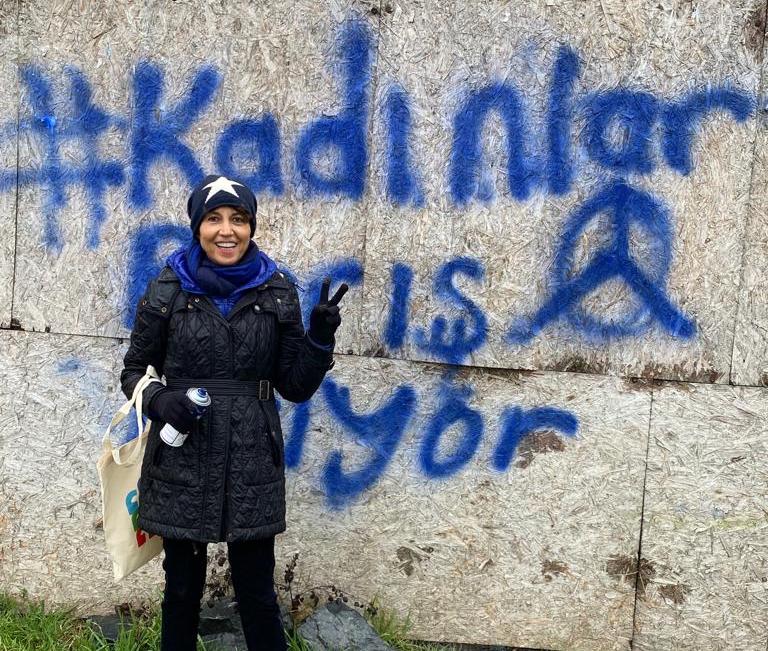In her column, Gülseren Onanç, the Founding Chair of the SES Equality and Solidarity Association, argues that in a world where masculine politics promotes hard power, the world needs women’s wisdom and women’s resistance more than ever.

Gülseren Onanç
It has been almost a month since Russia’s invasion of Ukraine. United Nations High Commissioner for Refugees has announced that ten million people fled the country. According to the UN data, most refugees travelled to Poland, where the number has reached 2,113,554. People are still on the move.
The death toll of the conflict is rising every day. According to the OHCHR data (on March 20), at least 900 civilians died in Ukraine. There is a controversy over the number of Russian and Ukrainian soldiers killed. The fighting continues around the country, especially in Mariupol, which will increase the suffering. It is disappointing to see that humanity has not been able to find a resolution to this conflict.
In the policy arena, where authoritarian governments are more common than democracies, the politicians of Western countries are unfortunately giving a bad account. Punishing Russian people, businesses, athletes and artists in order to punish Putin is preparing an end to the globalization process that the West has established. Moreover, it weakens those who support peace in Russia.
Masculine politics proposes that the only way to bring a dictator to his knees is through military and economic power. The human lives lost in this process and the human tragedy that will take a long time to recover are disregarded. At this point, we desperately need a lens on creating peace and seeking negotiation and reconciliation. I have heard many people say, “If Angela Merkel had been in office as the Chancellor of Germany, this problem could have been resolved by consensus.”
According to Hannah Arendt, acting politically means feeling responsible and taking a stand. Freedom and action for her are the same thing. As someone who adopts Hannah Arendt’s understanding of politics, I felt compelled to take action on March 8 to raise the voice of peace. Although I was very excited to participate in the March 8 Feminist Night March every year, even though the colourful and creative actions of young women activists and LGBTI+ individuals gave me hope, I took another action on my own. I followed Hannah Arendt, who said this action had to be different from my actions in my daily life. Taking a video and sharing it on social media has become a part of daily life. I had to do something different to give a voice to peace, to feel freer.
It was very easy to figure out what to do. I found Demet Evgar’s one-person protest in one of the most central locations of Istanbul very valuable.
Demet Evgar, a prominent actress and the Goodwill Ambassador of UN Women Turkey hung a banner at the entrance of a subway station. After placing the banner, she called out to those gathered around her: “I am a woman, equality is my right. I’m a woman, I don’t want to be killed. I am a woman, I am aware of my power, I am changing and transforming.”
#WomenWantPeace
I decided to write a slogan on a wall at a construction site. I was never into graffiti in my youth. But if I had a word to say and a spray paint in hand, there was nothing to prevent me from doing it. First, I went and bought the paint. I chose the colour blue, which is the colour of peace and tranquillity. It was noon, and there was a crowd of children and parents in front of the primary school. A girl leaving school was very interested in my act of writing. “I want to write “I Love You too,” she told the person who came to pick her up. I wrote on the wall “#WomenWantPeace.” The little girl read it out loud. I asked her to read it with me, and she didn’t mind, and we shot our video together with the slogan “Women Want Peace”. I felt freer after this action.
With this enthusiasm, I went to the Feminist Night March. It is a special pleasure to get past the police officers of the Interior Minister Süleyman Soylu, who has blocked Istiklal Street and all the streets leading to it, by setting up barricades in Istanbul. The twentieth Feminist Night March, held every year since 2003 on the night of March 8, against masculine-state violence, patriarchy, and war, was also wonderful.
Women want peace, they want freedom, they want equality. We will continue to fight for them.
The world needs women’s wisdom and women’s resistance more than ever.

